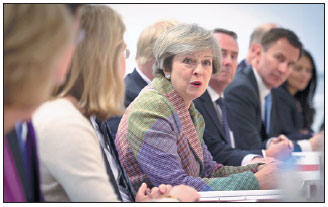May loses Brexit battle in top court
Downing Street is 'disappointed' but will 'comply with judgment'
The Supreme Court in the United Kingdom has ruled that Prime Minister Theresa May's government must seek the approval of Parliament to trigger the process by which the UK leaves the European Union.
The 8-3 decision by the country's top judges upheld a High Court ruling in November that the government must not bypass MPs by using its executive power to launch so-called Brexit. The government had appealed the earlier judgment.
The ruling does not overturn last year's referendum vote to leave the EU and is unlikely to slow the process. But it gives an opportunity for Parliament to influence the government's negotiating stance.
Attorney General Jeremy Wright, the government's senior law officer, said: "The government is disappointed with this outcome." However, it will comply with the judgment.
Lawyers for the private individuals who brought the case described the decision as a victory for democracy and the rule of law.
They had said the government did not have the right to repeal EU laws that granted rights to British citizens without Parliament's agreement.
May had already taken the sting out of the widely predicted Supreme Court ruling by promising to put a bill before Parliament to approve Article 50, which will formally trigger two years of negotiations with the UK's 27 EU partners.
The prime minister wants to launch the process by March. She is expected to try to stick to that timetable by presenting a short bill to MPs as early as this week.
Ministers had already drawn up a variety of legislative options in anticipation of losing the Supreme Court appeal. The advantage for the government in presenting a short bill is that it would be more difficult for MPs to amend.
Progress won't delay
The government had feared that progress could be delayed by having to extend the approval process to regional assemblies in Northern Ireland, Scotland and Wales. However, the Supreme Court ruled that need not happen. It is unlikely Parliament will block the triggering of Article 50 because MPs will not want to be perceived as contradicting the will of a majority of voters. However, some MPs intend to use the opportunity of a debate to temper a so-called hard Brexit that would include leaving the single market and customs union.
Jeremy Corbyn, leader of the main opposition Labour Party, has said he will instruct his MPs to back the government's invoking of Article 50.
But he is expected to try to amend the Brexit legislation to allow Parliament a final say on whatever deal May negotiates with Brussels.
Sterling fell and London's FTSE 100 index rose on Tuesday after the Supreme Court ruling.
The writer is a senior media consultant to China Daily UK.
editor@mail.chinadailyuk.com
|
UK Prime Minister Theresa May holds a meeting about Brexit on Monday.Stefan Rousseau / Reuters |
(China Daily 01/25/2017 page12)









